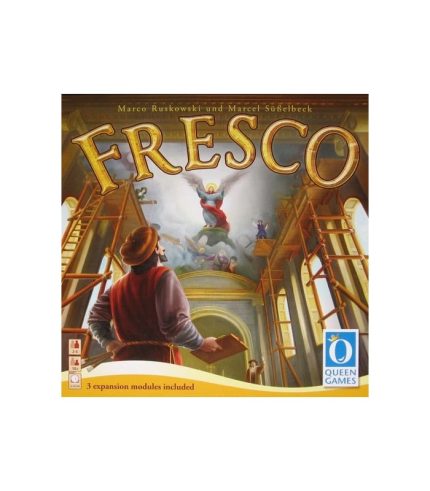The original city-building game Big City returns to print in a 20th Anniversary Jumbo Edition with buildings 33% larger than the original game and revised property trading rules.
In Big City, players acquire cards in eight different neighborhoods, then use them to lay out buildings either one, two, or three spaces large. The points they receive for a given building is a base score, plus bonuses for the buildings surrounding it. Someone must play city hall (scoring no points for themselves) in order for anyone to start placing any structure beyond the simple residences and business. As for what differs from the original game in this new edition:
• Redevelopment Phase – This new mandatory phase happens at the end of each round of player turns (i.e. after all players have acted). In point order (first to last) each player must surrender one property from their hand, and optionally they can surrender a second property. Then in reverse point order, each player takes back a number of cards equal to the number they surrendered. Cards are normally played face-down so that only the neighborhood is visible. However, a player can “jump to the front of the line” by choosing to play their card face-up. However, this can be done only when the card is currently usable, so you cannot use this method if you’re trying to trade neighborhood properties which are not yet in play. (You can still trade them, just face-down only.)
This redevelopment phase helps to solve the stand-off issue in which players are tempted to hoard properties when the person owning the neighboring property was also doing the same thing. Now the city enforces a “use it or lose it” policy.
• Escalating City Hall Points – City Hall starts the game worth 0 points, but each round it escalates by 1 point up to a maximum of 5.
• Early Game End – If everyone passes or uses the exchange action, the game ends immediately. That means there is no guarantee your city will become a Big City. Be very sure not to leave the leader in control of the last downtown property before City Hall is built!
• Base Game 2-4 players only – The original edition allowed up to 5 players, but this was widely-considered to be too many players because such a large proportion of neighborhoods started the game on the board and the action became crowded in a hurry. As per Benno’s request, the base game is now just 2-4.
• New Waterfront Tile – Basically it’s a neighborhood where nothing can be built. It acts as both a barrier to adjoining neighborhood placement, but also it provides a bonus to residential placed nearby.
























